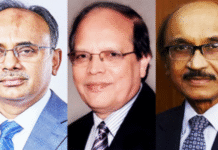
As Bharatiya Janata Party (BJP) leaders, including Indian Prime Minister Narendra Modi and Home Minister Amit Shah, repeatedly claimed during the November elections in Jharkhand that “Bangladeshi infiltrators” were altering the demographics of tribal regions such as Santhal Pargana, activist Siraj Dutta decided to file RTI applications (request for information under the Right to Information Act) with the home ministry.
When the replies finally arrived, they revealed a glaring lack of evidence to support assertions about alleged Bangladeshi infiltrators or cases of “land jihad” and “love jihad.”
Similarly, despite BJP claims that Bangladeshis constitute the highest number of illegal immigrants in India, the latest annual report by the Union home ministry tells a different story.
Due to the historical Islamic and colonial past, Hindu masses can easily be mobilised against the Muslims or any non-Hindus. BJP manipulates these underlying resentful emotions among Hindus to win the election. Bangladeshi illegal immigrants narrative shall be seen in this context
The report states that between April 2023 and March 2024, most foreigners deported from India for entering without valid visas or documentation, or for overstaying their visas, were from Nigeria. Out of 2,331 deportations during this period, 1,470 were Nigerian nationals, followed by 411 Bangladeshis and 78 Ugandans.
Also, while there were widespread assertions of Hindu minorities fleeing Bangladesh due to “communal violence” following the ousting of the Sheikh Hasina regime on 5 August last year, data from the Border Security Force (BSF) South Bengal Frontier contradicts these claims.
The statistics reveal that Muslims outnumber Hindus as illegal migrants in India since 5 August, with only a negligible percentage of Bangladeshi Hindus citing persecution as their reason for illegal entry.
All these examples reveal a consistent pattern of the BJP using unsubstantiated claims and selective narratives regarding the Bangladeshi immigrant issue to polarise public opinion, exaggerate perceived threats, and advance a political agenda.
In some ways, the blame for such rhetoric by the ruling party in India also falls on Bangladesh’s former prime minister Sheikh Hasina.
According to Dr Muqtedar Khan, Professor of Political Science and International Relations at the University of Delaware, one of Hasina’s biggest foreign policy failures was her inability or refusal to hold Modi accountable for his hate speech against Bangladeshis.
He recalled that during the heydays of India-Bangladesh and Modi-Hasina relations, BJP leaders demonised Bangladeshis to essentially generate anti-Muslim sentiment and consolidate votes along religious lines. Amit Shah referred to Bangladeshis as “termites” that were eating away at India. And although he specifically mentioned Bangladeshis, his rhetoric was a veiled attack on Muslims.
“Modi, the close friend of Sheikh Hasina, made an ugly reference to ‘Ghuspitiyas’ (intruders) during his 2024 election campaigns. He was targeting Indian Muslims. But he used the term again calling the opposition as ‘Ghuspitiya Gatbandhan’ (Intruder Alliance) more recently to say that the opposition supports Bangladeshi immigrants,” Dr Khan said.
To him, the goal of BJP by doing so is to create fear of Muslims in the hearts of Hindus and use that fear to cash in at the polls. “Ironically the Bangladesh GDP per capita is higher than some of the states where this hate speech tactic works such as UP, Bihar, Jharkhand and Assam,” Dr Khan remarked.
Snigdhendu Bhattacharya, an independent journalist based in Kolkata, highlighted that Narendra Modi brought up the issue of illegal immigration from Bangladesh even before he became India’s PM.
In 2014, during the parliamentary election campaign as the BJP’s prime ministerial candidate, Modi triggered a controversy while campaigning in West Bengal when he said that he would drive away “every single Bangladeshi infiltrator” should he come to power.
“As West Bengal chief minister Mamata Banerjee challenged him and said she would not allow anyone to touch any Bangali living in West Bengal, Modi explained that he was talking of two kinds of Bangladeshis – those who worship Maa Durga are sons and daughters of India’s soil and will get protection in India, but those who don’t will have to leave,” Bhattacharya recalled.
Thus, without directly mentioning Hindu or Muslim, he made the distinction clear – Hindus with a background in Bangladesh are refugees, whereas, Muslims were infiltrators. This was how the basis of the controversial Citizenship Amendment Act (CAA) of 2019 was laid – focussing on migration from Bangladesh – even before Modi took charge as the country head.
“This strategy has paid them good dividends in the Bangladesh bordering states of Assam and West Bengal, where migration from Bangladesh is believed to have effected demographic changes – the share of the Muslim population noticeably increasing in both West Bengal and Assam over the past few decades,” Bhattacharya added.
The BJP-associated organisations cited this demographic change, contrasting the picture with the decline of the Hindu population in Bangladesh. This campaign happened at a time Bangladesh itself was going through a phase of turmoil, especially between 2013 and 2017, when the killings of atheist bloggers, the emergence of some Al-Qaeda and ISIS-inspired organisations like ABT, incidents like the attack on the Holey Artisan Bakery and the spread of JMB networks in West Bengal, creating panic among the masses on this side of the border.
“Thus, while the BJP has continuously used ‘Bangladesh’ as one of their biggest internal political issues since 2014, despite the friendliness with Sheikh Hasina, incidents that happened in Bangladesh also contributed to the fear psychosis that developed among a section of people living in Indian states bordering Bangladesh,” he explained.
Dr Amit Singh, a postdoctoral researcher at the Center for Social Studies (CES) in University of Coimbra, whose research focuses on Hindu religious populism and its impact on Christian and Muslim minorities in India, also commented on the BJP’s focus on the narrative of Bangladeshi illegal immigrants, arguing that it is primarily politically motivated.
According to him, the BJP’s narrative is a response to its poor performance across various sectors. Unable to win elections on the strength of its socio-economic achievements – especially under the leadership of far-right, Hindu nationalist Prime Minister Narendra Modi, during which India’s socio-economic progress has stagnated – the BJP resorts to creating an “imaginary enemy” to blame for its failures.
“Due to the historical Islamic and colonial past, Hindu masses can easily be mobilised against the Muslims or any non-Hindus. BJP manipulates these underlying resentful emotions among Hindus to win the election. Bangladeshi illegal immigrants narrative shall be seen in this context,” he explained.
Dr Singh further elaborated that the Rashtriya Swayamsevak Sangh (RSS) currently dominates India through its political arm, the BJP. The RSS, a Hindu militant organisation, has deep-rooted Islamophobic tendencies and promotes ideologies that are both anti-democratic and anti-secular.
Founded in 1925 as a response to Muslim nationalism, the RSS has long blamed Muslims for the decline of Hindu culture and India’s progress. Although politically restricted until the 1980s, the rise of Hindutva politics under Prime Minister Narendra Modi has allowed these Islamophobic narratives to gain widespread traction.
“It has also been proven that communal riots always benefit BJP in elections. Thus, one shall not be surprised if the BJP is promoting narratives of Bangladeshi illegal immigrants. Without spreading hatred against Muslims and Christians, BJP will lose its political steam,” Dr Singh added.
Michael Kugelman, Director of the South Asia Institute at the Wilson Center think tank in Washington, DC, however, stresses that concerns over illegal immigration from Bangladesh have existed in India for some time and that recent events in Bangladesh, including some attacks on Hindus, make BJP’s messaging more compelling to certain sections of the Indian population.
“The BJP’s Hindu nationalism entails advocating on behalf of Hindus not just in India but also beyond, and especially in neighbouring states. Given that Bangladeshi Hindus did get caught up in the retributive violence that played out following Hasina’s ouster, and given other recent developments in Bangladesh – particularly the reemergence of pro-Pakistan actors and the emboldening of anti-India Islamist elements – there is a broader backdrop of anxiety in India that invites the dissemination of narratives that project the idea of India under threat,” Kugelman explained.
He believes that the BJP has strong political incentives to promote these narratives, as its electoral setback last year, the struggles of the Indian economy, and a more energised opposition have all placed the party on the defensive.
“In that sense, it’s the right time to rally the base,” said Kugelman, before adding, “The BJP is taking a bit of a gamble, though.”
He speculated that one likely reason for the BJP’s underwhelming electoral performance was voters pushing back against the communal rhetoric and majoritarian policies that have come to characterise the party’s politics.
“Given this, resorting to Hindu nationalism to rally support can’t be taken as a given. But in this particular case, with Bangladeshi Hindus having faced very real threats, these BJP narratives are likely to register and resonate among the Indian public,” he concluded.
tbs









